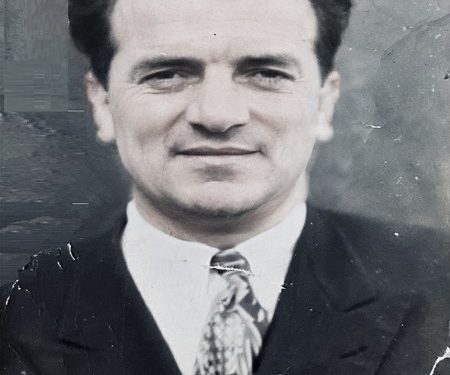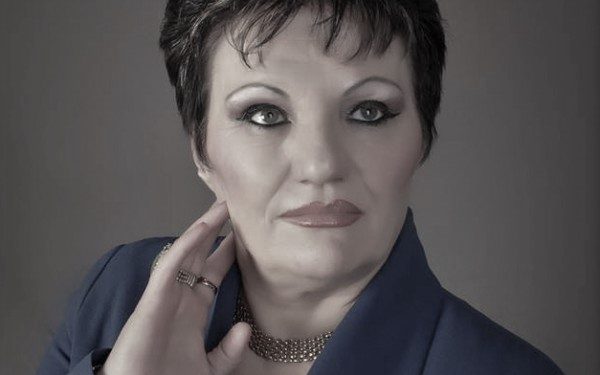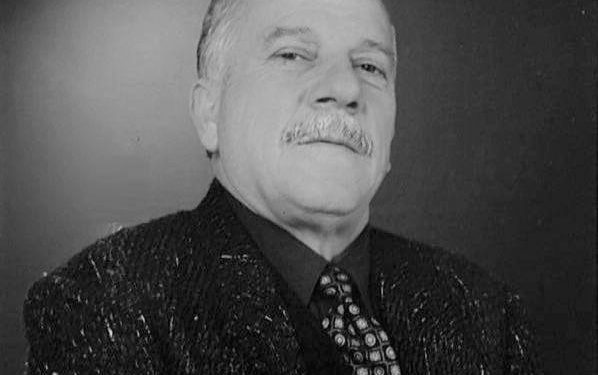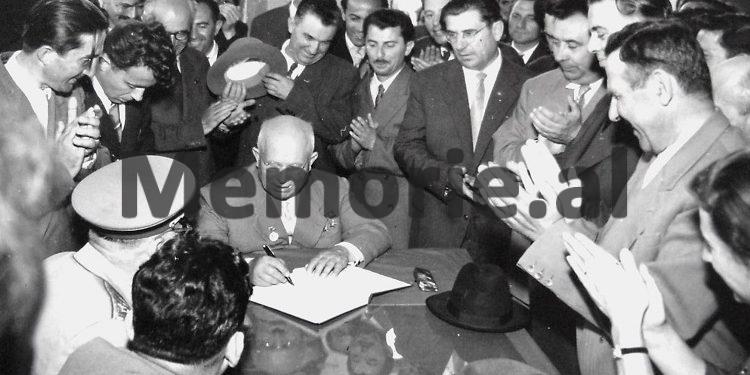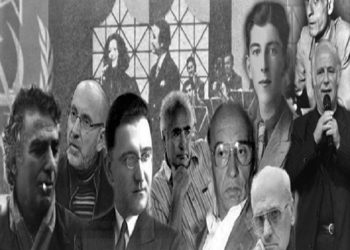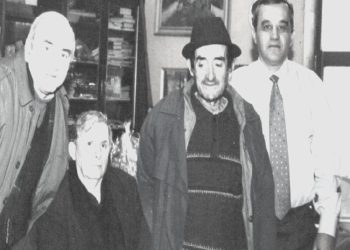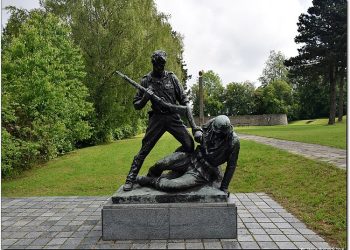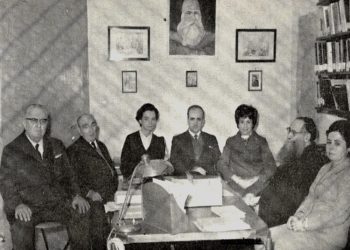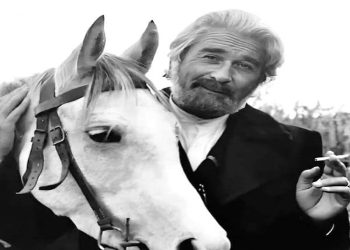By Raimonda Moisiu
Memorie.al / ‘Deserved Artist’, outstanding Korça tenor, now separated from life, Piro Sulioti, was born in the city of Korça, in a typical autochthonous Korça neighborhood, with the sounds of serenades and motifs from light Korça music, in September of the year 1924. Somewhere around the age of 20, he started singing at the ‘music polls’ of Radio – Korça, and was a participant in all the cultural activities that were organized in that city, especially at that time, for young artists. Still at a young age, he leaves Korça and goes to study nursing in Tirana, where he graduates as a medical assistant. There he is active in various artistic, musical and cultural activities, and very soon he became known throughout the country, as a young singer from Korça.
In addition to the serenades and songs with military motifs that the Korça artist Piro Sulioti sang, in the Army Ensemble, he caught the eye of prominent composers, for his clean and clear vocals, and in 1954, the composer Kristo Kono, would believe the main role of the first Albanian operetta “Agimi”, in the role of “Falcon”.
Around these years, and for several decades, he would perform the characteristic songs of Korça, becoming one of the main tenors of the characteristic and historical group, “Lira”, of Korça, a role he kept until the end of his life.
It would then bring to light a bouquet of Korça folk songs, (most of them still unsung) and would be appreciated with various prizes in festivals and music polls of that time. He would also sing in front of the high leadership of the socialist state, for Enver Hoxha and for other leaders of that time.
He was the only Albanian singer who, around the 60s, sang in front of Khrushchev, during his visit to the city of Korça. The korchar artist did not “drunk” the Soviet leader, only with serenades, korchar folk songs and Russian songs, but he also got Khrushchev drunk with brandy, so much so that he would put the cell on his head, on top of that, a kind of “fun” that only the cheerful and talented singers of Korça know how to turn it on.
In 1968, he traveled with the Folk Song and Dance Ensemble, alongside the legend of Albanian music, the famous iconic artist, Vaçe Zela, and with other artists in China, to sing in front of Mao Zedong, etc. In 1978, Piro Sulioti was awarded the “Deserved Artist” award. The infatuation and passion for the pentagram made him turn music and art into a family tradition.
His son is the famous tenor Gjergji Sulioti, and his daughter, Zhani Sulioti, the subject of this interview, is a music teacher. Korça serenades and the characteristic music of that city were never separated from Piro, they were always friends accompanying him, until the last moments, even when illness and old age weakened him, and he continued to sing. A life that resembles a novel or drama, in the trial of the sad and beautiful journey of life.
A classic story about a classical genius of art and music, about the “Deserved Artist”, the prominent Korça tenor, Piro Sulioti, comes in this interview from his daughter, Mrs. Jean Sulioti. The Korçar artist has always liked to play with music, sometimes with serenade, sometimes with light songs, sometimes with popular ones and sometimes in opera, giving through their connections, messages for the present, preserving the musical values of tradition and culture Albanian. For more follow this interview.
– Ms. Zhani, first of all, I thank you for agreeing to give this interview, to bring back to memory the “Honored Artist”, one of the most prominent tenors of Albanian music, Piro Sulioti, who has already passed away. How do you feel about this interview, do you feel it is a tribute or a conveyance of the civic, cultural and historical values of our Korça?
I would like to thank you from the bottom of my heart, for the opportunity you offered me, to remember and bring to the attention of the Korça art-loving public and all Albanians, the merits and values of my father, that most of the powers that come and go, but have left him in forget, the outstanding tenor of the historical band “LIRA”, from Korça, as you also point out, in the relevant question, the ‘Deserved Artist’, Piro Sulioti.
The Korçar artist and my father, Piroja, has only physically separated from life, but for us, his son and daughters, his many family members, he is here, among us. From the vocals, from the serenades, from the advice, and especially from his humor, full of humor, joy and outstanding that accompanied him his whole life. Of course, this interview is a tribute and requiem, because an artist like Piro Sulioti, with his extraordinary values, cannot be left in oblivion. He has left us a great artistic wealth. I am not exaggerating, even if I told you with full conviction, that it is irreplaceable.
– The Sulioti family is an autochthonous family of citizens and intellectuals from Korça. What are your memories from childhood, how did your father, the famous tenor Piro Sulioti, find himself on the beautiful path of the art of music? Did he inherit the musical gene, or was it his gift?
Normally, there would be a family legacy, a fact that is fanatically preserved to this day, by the Sulioti family and its descendants. Like the well-known tenor, my brother Gjergji Sulioti and I, personally, the nephews and nieces, continue with dedication, talent and kindness, the musical family tradition. Endless memories from my father, but also from many other citizens of our Korca, especially artists, who had friendly relations with our father and our family.
Piroja has had a passion for music since his childhood. He started singing with his friends from an early age, and continued to be an active participant in music polls at Radio Korça and reached the stages of the People’s Republic of China, with various ensembles of the country, in the tours held at the time. Also, until almost the end of his life, he remained one of the main tenors of the characteristic group of Korça, the famous “LIRA”.
-Can you describe moments from his experience? When did he start singing? What is the first song he sang?
He started singing early, as I mentioned above, but as an amateur singer, he became known around the 40s. My father’s luck was that he sang in many repertoires, such as; serenades, light music songs, folk songs, foreign songs, but also lyrical songs from the opera. His first songs, especially those that had great success, and are still interpreted today (but not the kind of interpretation of my father), were “Jorgjica”, “Unfaithful”, “Last night”, etc.
– What can you tell us about his musical influences in light, popular music and serenades? What about the opera?
For lyrical music in 1954, the great Kristo Kono would entrust the main role of “Falcon”, in the first Albanian operetta “Agimi”, which had an extraordinary success. He even dedicated that historical role to me, his daughter, who had just been born. However, lyrical music had not yet taken root in the country’s culture, which is why it drove away many artists, including Piron.
Folk songs were usually sung at weddings and family celebrations, thus keeping alive the tradition of the city. As for light songs and serenades, they were his whole life, he never separated them from himself, and he was always in shape to sing them at any moment. I remember the last days of his life, lying there in bed, always singing his own serenades. Just like then, with the same rhythm, but with vocals weakened by old age.
– Your father is known mainly as one of the main tenors of the characteristic Korça band “Lira” and as an early fan of his, I noticed an understanding between the dynamics of music, singing and emotional interpretation, which gave them power of sounds, the melody of serenades, popular songs, light songs, ballads or those with a military rhythm. What can you tell us about this?
Piroja had an incredible emotion, in terms of singing and music as a whole. For each song you were inspired differently, I don’t know how he always managed to perform, based on the inspiration. Surprisingly, his facial expression, posture on stage, etc. changed. Smile or sadness, were drawn and radiated to the audience. He always adored the applause and gas of the public. His love for serenades and his hometown, Korça, made him return to the “City of Dreams” and not continue his career in Tirana. It was always said that; “The serenades with Korça are like a fish in water. It cannot live outside of it.”
– On various televisions and social networks, songs and filming of archives, of concerts, that the famous tenor Piro Sulioti, has given inside and outside the country, are circulating. What can you tell us about this?
It is a small part of them, because most of them are covered by the “dust of oblivion”, in the various Radio and Television archives. Normally, most of it is not filmed or recorded, because back then, it was a different time, the written press and visual media were almost non-existent, so the producer was the artist himself, or the state.
For decades, the concerts that my father gave in Yugoslavia, in Greece, in China, in the Soviet Union, in Romania, etc., were blocked, because of the country’s socialist system. But all this, my father passed on to us in our memory and we never forget most of his activities or various stories.
-What were some of the concerts and meetings with high-ranking personalities that left the most impression on your father? Did your father tell you any special funny or sad experiences?
My father gave concerts in front of many high-ranking personalities of the system and regime of the time, when art and music did a lot for socialist realism, Soviet-Albanian friendship, and the Chinese Cultural Revolution. He gave dozens of concerts for Enver Hoxha, Mehmet Shehu, Ramiz Ali, Mao Zedong, Khrushchev, etc.
The funny and sad experiences that he told us were almost daily and I noticed that as an artist in spirit and talent, my father felt and suffered them more than anyone else. I remember the humorous stories he told from China, the longing and the tears in Kosovo, but also many different occasions, for his fellow singers.
– I once heard talk about your father and the artist from Korça, Piro Sulioti, that around the 60s, during Khrushchev’s visit to Korçë, he not only sang famous Russian songs in front of him, but also danced for fun with him. Can you describe that moment for us? Was there criticism afterwards or praise?
This episode, in fact, is special, interesting and very impressive, but also for the “uproar” that made at that time, which was talked about for a relatively long time, among the artists themselves and the Korçar public. Khrushchev’s visit to Albania, in June 1959, was one of the most important visits for the time system. The organizers of a special concert in his honor on the last day of Khrushchev’s stay in Albania called Piro to sing at that concert.
The father described Khrushchev as a very simple and cheerful man, as far as he communicated and got to know him Khrushchev, after he ate the fish “carp” ordered by himself, he also drank mulberry brandy, became merry and started dances the characteristic Russian dance with his father, when Piro, for a moment of exaltation, snatches the cell from a dancer and puts it on Khrushchev’s head.
While they danced, both embraced, and Khrushchev with the Albanian hair on his head, laughed and shouted; “Thank you, thank you”! This was an unexpected and surprising move for senior party officials. A part of them was alarmed, threatening Piro, about the consequences or punishments he could have, after that. But it took the intervention of Enver, personally, that averted vicissitudes and political consequences for the father.
– Did your father write poems or song lyrics and serenades?
No, dad didn’t write poetry or song lyrics. Piro has helped poets and composers, simply from his experience as a singer, but I cannot say that he was a poet. Serenade, I might say; yes, that they wrote and sang to the Korça maids, all the men in love from Korça, and it blows my mind that my father is also among them. In 1967, he started writing a novel, (I have saved it somewhere), but he never finished it.
–Besides the portrait and intellectual stature, but also the talent of his contribution to music, have you collected them on a CD or an album? If so, what is their research role?
Here it gives me the opportunity to open another major issue for the Albanian discography. In most cases, songs, concerts, videos, etc., are as mentioned above, they are archived and no one can get them. This seems really absurd to me, because even the author himself cannot retrieve them from the archive.
Most of the songs are in “darkness”, because no one takes the courage, courage and initiative to bring these precious parts of Albanian culture to light, to see not only this heritage and identity of Albanian art and music, but and the light that they have left behind, for the future generations, for its culture and history, be it the citizens of Korça, but also the Albanian culture as a whole.
I really do not feel good about this and I am very sorry, that my father, Piro, struggled for years, but only managed to collect two pieces. Most of them have been made illegally on CD, throwing them on the market, without knowing the copyright and without getting permission from anyone. I appeal to you: “Please give us what belongs to our father”!
-What is your message, in valuing and not forgetting such values?
Assessments are subjective, they come and go with time, fashion, regime, etc. and we must solve the gaps, the tradition, continue it and spread as much culture and music as possible. Artists should be encouraged, not only to identify art, culture, music and the solution of unpleasant situations, to the detriment of art, tradition and cultural and musical heritage. For this, we should have neither fear, nor anger, nor jealousy.
We must have wisdom, just as this distinguished elite of the golden generation of artists had, from Vaçe Zela, Ramiz Kovaçi, Avni Mula, Gaqo Çako, Kristo Kono, Piro Sulioti, etc, etc, sorry if I have not mentioned anyone , that there are many. To mention, bring to attention and remember the history and icons of art for art, and not for the market.
Let’s try to convince the Albanian society and the various music groups for artistic justice. And not only that! Let’s not forget that once upon a time in this country, there were artists who melted their soul, momentum, talent and desire, just for an applause, for a smile, for a dignity, without clips, without managers, without interviews, without social media and studio with apparatus, not for trade, but for making history. And they succeeded! They made history! Memorie.al




